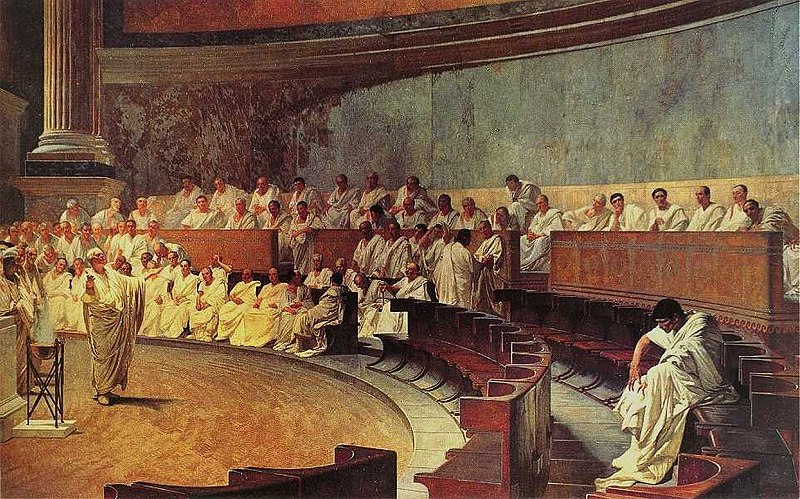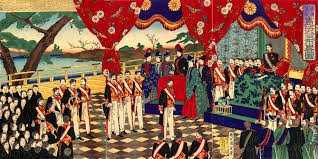Who is Catiline: Catiline and the Roman Republic Through Source Criticism
Overview
In this lesson plan, we are going to look at Catiline (108-62 BC), a Roman patrician who attempted to overthrow the Republic but failed. Specifically, we are going to look at how Cicero (106-43 BC) and Sallust (86-35/34 BC) portrayed Catiline in their separate works, “The First Catilinarian Oration” and Catiline’s Conspiracy and the reasons behind their portrayals. By the end of this lesson, our goal is to not only know who Catiline is but also what he symbolized in Roman history and the importance of source criticism in historical studies.

In this image, Catiline was portrayed sitting alone away from the other senates, while Cicero spoke. Image source: Wikimedia
Context
The Century of Civil Wars
From the second century BC to the first century BC, the Roman Republic experienced a century of civil wars starting with the First Servile War (135 -132), and these wars eventually led to the start of the Roman Empire. In this turbulent period of time, we have witnessed the rise and fall of many people - to name a few, there is Sulla, the Gracchi brothers, Marius, Caesar, Pompey, Mark Antony, etc. Some other features exhibited during this period were that the Senate granted the consuls the power of dictatorship more frequently, that Rome was expanding into a greater scale than ever before, and that discrepancy grew bigger between the rich and the poor. With a growing territory, the constitution established when Rome was still a city-state no longer applied to the huge country it was becoming. These were some of the characteristics in the century of civil wars of the Roman Republic, and our protagonist, Catiline, was born in this period.
Who is Catiline (in historical facts)?
Different people may have different answers to this question - Cicero and Sallust definitely did. In this section, we are going to learn a little about Catiline not with judgment but simply with the facts in his life. Lucius Sergius Catilina was born in 108 BC to a declined Roman patrician family, meaning his family descended from nobility but failed to produce a consul for years. He had taken several governmental positions, including the praetor and governor of Africa, but his attempts to become the consul (the highest office) never succeeded. He led a conspiracy to overthrow the Roman Republic in 63 BC, after losing in the consul election the previous year. Cicero exposed his plot in a senate meeting and forced Catiline to leave the city. After being exiled from Rome, Catiline died in 62 BC in a battle with Antonius Hybrida near Pistoia.
Persona
An important aspect in Roman literature was the development of a “persona,” a social image for a character. So, it is important to keep in mind that it will always be hard to determine who Catiline really was. We can, however, analyze how Catiline was depicted and the reasons behind these narrations.
Guiding Questions
Although Catiline was an actual existent person, Cicero and Sallust had ascribed to him different personas in their works. As you read through the following two excerpts, try thinking about and answering the following questions.
- What kind of persona is the author trying to create for Catiline?
- What other devices did the author use other than establishing a persona?
- How is their Catiline different from the Catiline you see with the historical facts?
- Given the context of the creation of the work, why would the author want to portray Catiline in such a way?
- How would understanding or not understanding the context of the source affect our understanding of Catiline?
Excerpt One
“The First Catilinarian Oration”
Context
Catiline lost to Cicero and Hybrida in the consular election in 64 BC. The following year, he conspired to overthrow the republic with other aristocrats. In November of 63 BC, Cicero called a meeting of all senates in Jupiter temple, and Catiline showed up. Cicero then made what is now known as “The First Catilinarian Oration,” a speech urging Catiline to leave the city. This is the first speech from a series of four speeches Cicero made to accuse Catiline. Cicero was a renowned orator and very experienced in rhetoric. He began his speech with a famous address to Catiline:
“When, O Catiline, do you mean to cease abusing our patience?”
Excerpts
One
“... And shall we, who are the consuls, tolerate Catiline, openly desirous to destroy the whole world with fire and slaughter? For I pass over older instances, such as how Caius Servilius Ahala with his own hand slew Spurius Maelius when plotting a revolution in the state. There was—there was once such virtue in this republic, that brave men would repress mischievous citizens with severer chastisement than the most bitter enemy. For we have a resolution 2 of the senate, a formidable and authoritative decree against you, O Catiline; the wisdom of the republic is not at fault, nor the dignity of this senatorial body. We, we alone,—I say it openly, —we, the consuls, are waiting in our duty.”
Two
“O Catiline, that you can still expect, if night is not able to veil your nefarious meetings in darkness, and if private houses cannot conceal the voice of your conspiracy within their walls;—if everything is seen and displayed? Change your mind: trust me: forget the slaughter and conflagration you are meditating. You are hemmed in on all sides; all your plans are clearer than the day to us...”
Three
“You are summoning to destruction and devastation the temples of the immortal gods, the houses of the city, the lives of all the citizens; in short, all Italy. Wherefore, since I do not yet venture to do that which is the best thing, and which belongs to my office and to the discipline of our ancestors, I will do that which is more merciful if we regard its rigour, and more expedient for the state. For if I order you to be put to death, the rest of the conspirators will still remain in the republic; if as I have long been exhorting you, you depart, your companions, those worthless dregs of the republic, will be drawn off from the city too.”
“What is the matter, Catiline? Do you hesitate to do that which I order you which you were already doing of your own accord? The consul orders an enemy to depart from the city. Do you ask me, Are you to go into banishment? I do not order it; but, if you consult me, I advise it.”
Excerpt Two
Catiline’s Conspiracy
Context
Catiline’s Conspiracy, also known as The Conspiracy of Catiline or The War of Catiline, was written by historian Sallust during the later half of the first century BC. Sallust was involved in politics once, but after he retired from public life, he became devoted in historical literature. In the book, Catiline’s Conspiracy, he discussed not just Catiline’s conspiracy but also the corruption of morality among Romans. He argued that Catiline was a product of the society and that Catiline embodied the rise and flaw of Rome. Sallust gave Catiline a heroic death and the end of the book.
Excerpts
Life of Catiline
“Lucius Catiline, scion of a noble family, had great vigour both of mind and body, but an evil and depraved nature. From youth up he revelled in civil wars, murder, pillage, and political dissension, and amid these he spent his early manhood. His body could endure hunger, cold and want of sleep to an incredible degree; his mind was reckless, cunning, treacherous, capable of any form of pretence or concealment. Covetous of others' possessions, he was prodigal of his own; he was violent in his passions. He possessed a certain amount of eloquence, but little discretion. His disordered mind ever craved the monstrous, incredible, gigantic.
After the domination of Lucius Sulla, the man had been seized with a mighty desire of getting control of the government, recking little by what manner he should achieve it, provided he made himself supreme. His haughty spirit was goaded more and more every day by poverty and a sense of guilt, both of which he had augmented by the practices of which I have already spoken. He was spurred on, also, by the corruption of the public morals, which were being ruined by two great evils of an opposite character, extravagance and avarice.”
The History of Rome
“The city of Rome, according to my understanding, was at the outset founded and inhabited by Trojans, who were wandering about in exile under the leadership of Aeneas and had no fixed abode…
They had a constitution founded upon law, which was in name a monarchy; a chosen few, whose bodies were enfeebled by age but whose minds were fortified with wisdom, took counsel for the welfare of the state… Later, when the rule of the kings, which at first had tended to preserve freedom and advance the state, had degenerated into a lawless tyranny, they altered their form of government and appointed two rulers with annual power, thinking that this device would prevent men's minds from growing arrogant through unlimited authority.
Now at that time every man began to lift his head higher and to have his talents more in readiness. For kings hold the good in greater suspicion than the wicked, and to them the merit of others is always fraught with danger; still the free state, once liberty was won, waxed incredibly strong and great in a remarkably short time, such was the thirst for glory that had filled men's minds. To begin with, as soon as the young men could endure the hardships of war, they were taught a soldier's duties in camp under a vigorous discipline, and they took more pleasure in handsome arms and war horses than in harlots and revelry. To such men consequently no labour was unfamiliar, no region too rough or too steep, no armed foeman was terrible; valour was all in all. Nay, their hardest struggle for glory was with one another; each man strove to be the first to strike down the foe, to scale a wall, to be seen of all while doing such a deed. This they considered riches, this fair fame and high nobility. It was praise they coveted, but they were lavish of money; their aim was unbounded renown, but only such riches as could be gained honorably. I might name the battlefields on which the Romans with a mere handful of men routed great armies of their adversaries, and the cities fortified by nature which they took by assault, were it not that such a theme could carry me too far from my subject.”
Corruptions in Rome
“But when our country had grown great through toil and the practice of justice, when great kings had been vanquished in war, savage tribes and mighty peoples subdued by force of arms, when Carthage, the rival of Rome's sway, had perished root and branch, and all seas and lands were open, then Fortune began to grow cruel and to bring confusion into all our affairs. Those who had found it easy to bear hardship and dangers, anxiety and adversity, found leisure and wealth, desirable under other circumstances, a burden and a curse. Hence the lust for money first, then for power, grew upon them; these were, I may say, the root of all evils. For avarice destroyed honour, integrity, and all other noble qualities; taught in their place insolence, cruelty, to neglect the gods, to set a price on everything. Ambition drove many men to become false; to have one thought locked in the breast, another ready on the tongue; to value friendships and enmities not on their merits but by the standard of self-interest, and to show a good front rather than a good heart. At first these vices grew slowly, from time to time they were punished; finally, when the disease had spread like a deadly plague, the state was changed and a government second to none in equity and excellence became cruel and intolerable.
But at first men's souls were actuated less by avarice than by ambition — a fault, it is true, but not so far removed from virtue; for the noble and the base alike long for glory, honor, and power, but the former mount by the true path, whereas the latter, being destitute of noble qualities, rely upon craft and deception. Avarice implies a desire for money, which no wise man covets; steeped as it were with noxious poisons, it renders the most manly body and soul effeminate; it is ever unbounded and insatiable, nor can either plenty or want make it less. But after Lucius Sulla, having gained control of the state by arms, brought everything to a bad end from a good beginning, all men began to rob and pillage. One coveted a house, another lands; the victors showed neither moderation nor restraint, but shamefully and cruelly wronged their fellow citizens. Besides all this, Lucius Sulla, in order to secure the loyalty of the army which he led into Asia, had allowed it a luxury and license foreign to the manners of our forefathers; and in the intervals of leisure those charming and voluptuous lands had easily demoralized the warlike spirit of his soldiers. There it was that an army of the Roman people first learned to indulge in women and drink; to admire statues, paintings, and chased vases, to steal them from private houses and public places, to pillage shrines, and to desecrate everything, both sacred and profane. These soldiers, therefore, after they had won the victory, left nothing to the vanquished. In truth, prosperity tries the souls of even the wise; how then should men of depraved character like these make moderate use of victory?”
Conclusion & Lesson Plan Creator’s Comment
After reading about Catiline from two authors, you may find some contradictions as well as similarities. Think back at the guiding questions:
- What kind of persona is the author trying to create for Catiline?
- What other devices did the author use other than establishing a persona?
- How is their Catiline different from the Catiline you see with the historical facts?
- Given the context of the creation of the work, why would the author want to portray Catiline in such a way?
- How would understanding or not understanding the context of the source affect our understanding of Catiline?
We cannot take either Cicero or Sallust’s account as the sole depiction of Catiline; even if we combine the two narrations, we still find it hard to create a complete picture. Nonetheless, as we look at the sources and the reasons behind the sources, we practice source criticism, through which we realize the biases and intentions of the authors. Cicero’s and Sallust’s incentives further help us understand how others regard Catiline, how he impacted Roman society, and he represented part of Roman society in a rather chaotic period.
Not just historical figures are products of society, but every creation is as well. When looking at any source, it is important to regard them as historical documents and as a product of the author’s intention, the social context, and perhaps our own understanding. Source criticism helps us look at history with a critical perspective and open our eyes to broader interpretations.
*For further reading, both materials (translated and original) could be found in the public domain for free.
The First Catilinarian Speech:
English
http://data.perseus.org/citations/urn:cts:latinLit:phi0474.phi013.perseus-eng1:1.1
Latin
https://www.thelatinlibrary.com/cicero/cat1.shtml
Catiline’s Conspiracy:
English
https://penelope.uchicago.edu/Thayer/e/roman/texts/sallust/bellum_catilinae*.html
Latin
http://www.columbia.edu/cu/lweb/digital/collections/cul/texts/ldpd_6859779_000/index.html
Bibliography
Cicero. Against Catiline. Translated by C. D. Yonge. London, 1856. Accessed July 10, 2021. http://data.perseus.org/citations/urn:cts:latinLit:phi0474.phi013.perseus-eng1:1.1.
Sallust. The War with Catiline. Translated by Bill Thayer. Loeb Classical Library, 1921. Accessed July 10, 2021. https://penelope.uchicago.edu/Thayer/e/roman/texts/sallust/bellum_catilinae*.html.





Post a comment Cancel reply